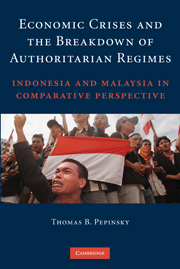 Economic Crises and the Breakdown of Authoritarian Regimes
Economic Crises and the Breakdown of Authoritarian Regimes Published online by Cambridge University Press: 21 January 2010
This chapter shows the development and logic of the different coalitions supporting authoritarian regimes in Indonesia and Malaysia. Indonesia's New Order rested on an alliance between the military and a small coterie of ethnic Chinese Indonesian entrepreneurs. Malaysia's Barisan Nasional coalition depended on (and still continues to depend on) an alliance between the Malay masses and a class of Malay entrepreneurs. These systems were stable and predictable. Each regime used largely informal exchange relationships to regularize mutual reward for leaders and supporters and also to systematize the threat of repression and violence for members of the polity outside of the support coalition. This stability enabled each regime to engineer rapid economic growth at rates nearly unparalleled in the developing world while embedding these support coalitions directly into the apparatus of political rule.
In the terms of the model of an economy introduced in Chapter 2, Indonesia's coalition was one between mobile and fixed capital, whereas Malaysia's coalition is one between fixed capital and labor. The broad actor categories – mobile capital, fixed capital, and labor – are theoretical ideal types, but in this chapter I link each ideal type to a concrete group with clear political allegiances. These mappings reveal the importance of the country-specific histories in understanding political coalitions and their economic interests. In the case of Malaysia, for instance, the regime depends not on “labor” writ large but specifically on the unorganized Malay masses. In Indonesia, fixed capital comprised both military-linked businesses and new pribumi (roughly, “indigenous”) entrepreneurs.
To save this book to your Kindle, first ensure [email protected] is added to your Approved Personal Document E-mail List under your Personal Document Settings on the Manage Your Content and Devices page of your Amazon account. Then enter the ‘name’ part of your Kindle email address below. Find out more about saving to your Kindle.
Note you can select to save to either the @free.kindle.com or @kindle.com variations. ‘@free.kindle.com’ emails are free but can only be saved to your device when it is connected to wi-fi. ‘@kindle.com’ emails can be delivered even when you are not connected to wi-fi, but note that service fees apply.
Find out more about the Kindle Personal Document Service.
To save content items to your account, please confirm that you agree to abide by our usage policies. If this is the first time you use this feature, you will be asked to authorise Cambridge Core to connect with your account. Find out more about saving content to Dropbox.
To save content items to your account, please confirm that you agree to abide by our usage policies. If this is the first time you use this feature, you will be asked to authorise Cambridge Core to connect with your account. Find out more about saving content to Google Drive.